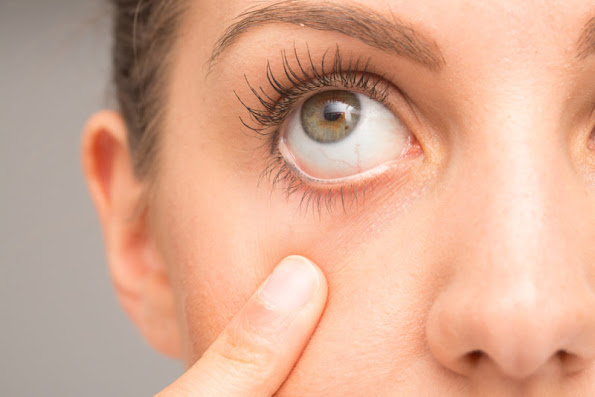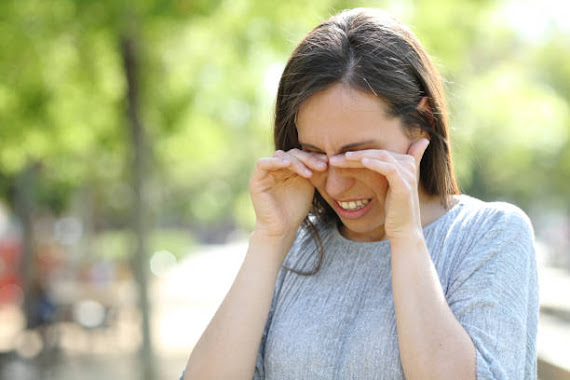Do Not Ignore Chronic Dry Eye Or Dry Eye Syndrome
Note: Friends, if you want to read this article in any other language, please change the language from the translate button at the top of this article.
 |
| Dry eye syndrome is a condition that occurs when the eyes do not produce enough tears |
What Is Chronic Dry Eye Or Dry Eye Syndrome?
Chronic dry eye, also known as dry eye syndrome, is a condition that occurs when the eyes do not produce enough tears, or the tears evaporate too quickly.
This can lead to discomfort, irritation, and inflammation of the eye surface.
Also read our other article: How to protect your eyes and eyesight
Treatment for chronic dry eye typically involves the use of artificial tears, prescription eye drops, or other medications, as well as lifestyle changes such as using a humidifier, avoiding certain medications, or taking breaks from computer or screen time.
Symptoms Of Chronic Dry Eye
The symptoms of chronic dry eye can vary from person to person but may include:
. Dryness:
A persistent feeling of dryness in one or both eyes is one of the most common symptoms of chronic dry eye. It may feel like there is something in your eye or that your eyes are gritty.
. Irritation:
Chronic dry eye can cause the eyes to become irritated, red, and swollen. This can be uncomfortable and may cause itching or burning sensations.
. Sensitivity to light:
Chronic dry eye can make the eyes more sensitive to light, causing discomfort and potentially making it difficult to see in bright or sunny environments.
. Blurred vision:
Chronic dry eye can cause your vision to become blurry or hazy, especially after reading or looking at a computer screen for a long period of time.
. Excessive tearing:
Paradoxically, chronic dry eye can sometimes cause the eyes to water excessively. This is because the eyes are trying to compensate for the lack of moisture by producing more tears.
. Difficulty wearing contact lenses:
If you wear contact lenses, chronic dry eye may make it difficult to keep them in place or wear them for extended periods of time.
If you are experiencing any of these symptoms, it is important to see an eye doctor or optometrist for an evaluation and treatment recommendations.
Causes Behind Dry Eye Syndrome or Chronic Dry Eye
There are several possible causes of dry eye syndrome, including:
. Age:
As we get older, our bodies produce fewer tears, which can cause dry eye.
. Hormonal changes:
Changes in hormone levels, such as those that occur during pregnancy, menopause, or while taking certain medications, can affect tear production and lead to dry eye.
. Medical conditions:
Certain medical conditions, such as rheumatoid arthritis, Sjogren's syndrome, thyroid disorders, or diabetes, can cause dry eye.
. Environmental factors:
Exposure to dry, windy, or smoky environments can increase the likelihood of developing dry eye.
. Medications:
Some medications, such as antihistamines, antidepressants, or diuretics, can decrease tear production and cause dry eye.
. Contact lens use:
Wearing contact lenses for extended periods of time or not following proper cleaning and care instructions can cause dry eye.
. Eye surgery:
Certain types of eye surgeries, such as LASIK, can cause temporary dry eye.
. Other factors:
Factors such as extended computer or screen time, dehydration, or inadequate blinking can also contribute to dry eye.
It is important to speak with an eye doctor or optometrist to determine the specific cause of your dry eye and develop an appropriate treatment plan.
Ayurvedic Home Remedies For Chronic Dry Eye
Ayurveda, a traditional system of medicine in India, offers several home remedies for chronic dry eye.
Here are some examples:
. Ghee eye drops:
Warm a small amount of pure ghee (clarified butter) and use an eye dropper to put a drop or two in each eye before bed. This can help lubricate the eyes and reduce dryness.
. Triphala eye wash:
Boil a teaspoon of Triphala powder in two cups of water and let it cool. Strain the mixture and use it as an eye wash to cleanse the eyes and reduce dryness.
. Rose water compress:
Soak a cotton pad in cool rose water and place it over closed eyes for 10 to 15 minutes. This can help reduce inflammation and soothe dry, irritated eyes.
. Amla juice:
Mix one tablespoon of amla juice with a glass of water and drink it daily. Amla, also known as Indian gooseberry, is high in vitamin C and can help improve eye health.
. Coconut oil massage:
Warm a small amount of coconut oil and massage it gently around the eyes, using your fingertips. This can help improve circulation and reduce dryness.
. Castor oil eye drops:
Place a drop of pure castor oil in each eye before bed. Castor oil is known for its anti-inflammatory and lubricating properties, which can help reduce dryness and irritation.
. Fennel seed tea:
Boil a teaspoon of fennel seeds in a cup of water for a few minutes, then let it cool. Drink the tea daily to help improve eye health and reduce dryness.
. Cucumber slices:
Place thin slices of cucumber over closed eyes for 10 to 15 minutes. This can help reduce inflammation and soothe dry, irritated eyes.
. Coriander eye wash:
Boil a handful of fresh coriander leaves in two cups of water for a few minutes, then let it cool. Strain the mixture and use it as an eye wash to help reduce dryness and improve eye health.
. Almond milk:
Soak a handful of almonds in water overnight, then remove the skins and grind them into a fine paste.
Mix the almond paste with a cup of milk and drink it daily to help improve eye health and reduce dryness.
If you are still experiencing chronic dry eye, it is important to consult with an eye doctor or optometrist for proper diagnosis and treatment.
Frequently Asked Questions About Dry Eye Syndrome
Here are some frequently asked questions about dry eye syndrome or chronic dry eye
Q: How is dry eye syndrome diagnosed?
A: A doctor or optometrist can diagnose dry eye syndrome through a comprehensive eye exam, which may include measuring tear production, evaluating the quality of tears, and examining the eye and eyelids for signs of inflammation or damage.
Q: What are the treatment options for dry eye syndrome?
A: Treatment options for dry eye syndrome can include artificial tears, prescription eye drops, medications to reduce inflammation, omega-3 supplements, lifestyle changes, and in severe cases, surgery.
Q: Can dry eye syndrome be prevented?
A: While it may not be possible to prevent all cases of dry eye syndrome, there are several steps that can help reduce the risk or severity of the condition.
They include avoiding dry or dusty environments, taking frequent breaks when using a computer or other digital device, staying hydrated, and using proper eye protection when necessary.
Q: Is dry eye syndrome a serious condition?
A: While dry eye syndrome may not be life-threatening, it can have a significant impact on quality of life, and in some cases, it can lead to complications such as corneal ulcers or infections.
Therefore, it is important to seek treatment if you experience symptoms of dry eye syndrome.
Q: Can dry eye syndrome affect anyone?
A: Yes, dry eye syndrome can affect anyone, although it is more common in women and older adults.
Q: Can dry eye syndrome cause vision loss?
A: In most cases, dry eye syndrome does not cause permanent vision loss. However, it can cause blurry vision or sensitivity to light, which can make it difficult to perform certain tasks.
Q: How often should I use artificial tears for dry eye syndrome?
A: The frequency of artificial tear use can vary depending on the severity of the condition and the type of drops used.
It is best to follow the instructions provided by your doctor or optometrist.
Q: Are there any natural remedies for dry eye syndrome?
A: Yes, there are several natural remedies that may help alleviate the symptoms of dry eye syndrome, such as increasing your intake of omega-3 fatty acids, using warm compresses, and avoiding exposure to dry or windy environments.
Q: Can contact lenses worsen dry eye syndrome?
A: Yes, contact lenses can exacerbate dry eye syndrome, especially if they are not properly fitted or if they are worn for long periods of time.
If you wear contact lenses and experience symptoms of dry eye syndrome, it is important to consult with your eye doctor.
Q: Can dry eye syndrome be a side effect of certain medications?
A: Yes, certain medications can cause or worsen dry eye syndrome, such as antihistamines, diuretics, and antidepressants.
If you are taking medication and experience symptoms of dry eye syndrome, it is important to talk to your doctor.
Q: How long does it take to treat dry eye syndrome?
A: The duration of treatment for dry eye syndrome can vary depending on the severity of the condition and the type of treatment used.
In some cases, symptoms may improve within a few weeks, while in other cases, treatment may need to be ongoing to manage the symptoms.
Friends, Stay Fit, Stay Happy
--------------------------------------------------------
Friends, if you liked it, please share it with your friends.
SHARING IS CARING.
Compiled by: Paramjit Singh Rana






Comments
Post a Comment